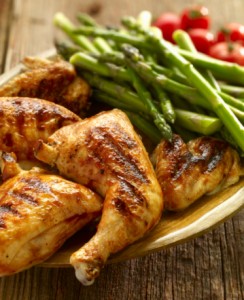When You Must Dine on “Fast Food”
I am one of the fortunate few who get to work from a home-office most days of the year. Because of the nature of my work, my physical location is not important to the task at hand. As such, I also have the opportunity to better control my food choices and eating habits during the work day. If you are in this category, be thankful that you are because — for most people — it is much more difficult to eat well during the work day.
Sometimes, however, my work requires my physical presence in the office — often for many days at a time. This week was such a week. Yesterday, as lunch time came and went, the pangs of hunger began to gnaw at me and I finally decided to run over to the local McDonalds for some lunch. Since I was very hungry, I reminded myself to order thoughtfully.
When those of us fighting the Battle of the Bulge are visiting a fast food restaurant, there are some really obvious things that we must do to avoid overeating and/or choosing the wrong kinds of food. These “obvious” things include to not order anything that is “deep fat fried” and to not “super-size” any order. It struck me, though, as I sat there “inhaling” my cheeseburger, that there are many other things that we can do that will also help prevent over-consumption of the wrong kinds of foods.
The first thing to consider is what you drink. Most fast food companies will provide “ice water” at no charge when you are making a food purchase. Not only can you save some money, but you can drink more water (please see the www.weeklyweightlosstips.com archives to read more on drinking water), which is something that you already know to do. Many wise fast food restaurants are also selling your favorite brands of bottled water, which can typically be refilled at the beverage kiosk if you are still thirsty when you finish your meal.
Not only is this important when comparing beverage choices (e.g., soda vs. water), but also when you consider the fact that fast food contains much more salt than what we typically would use on our own food at home. If you have been reading these articles for some time now, you have likely read some compelling reasons why we need to limit our sodium intake. Sodium causes us to retain water (which weighs about seven pounds per gallon) and the only way to safely regulate this (sodium and water retention) is to drink more and more water.
The next thing to consider is the condiments. Many fast food restaurants are suggesting salads as a low-calorie option to their traditional offerings. These are a great way to avoid higher fat, lower fiber alternatives, but with salads the dressing must be scrutinized, or else you may end up not saving calories at all. Dieticians suggest choosing the dressing type wisely, as well they recommend using the smallest amount possible.
If you order items other than salads, the same thing is true. Mayonnaise if a very high-fat food that should be avoided. Most restaurants will allow you to “special order” a small amount of your condiments (“light on the mayo, please…”) or just those that are lower in fat and calories. Mustard is a low fat, low calorie condiment, though it may not be suited to everyone’s individual taste.
The last thing that I would recommend that you keep in mind when visiting a “fast food” restaurant is to not get wrapped up in the “speediness” of the environment. One of the worst dining habits is to eat your meals quickly. The very nature of the fast food shop makes it difficult to slow down and enjoy your meal. Make a conscious effort to sit down, relax, and savor every bite. Don’t allow yourself to get caught up in the hustle and bustle of the surroundings. When you sit down at the table with your food, tell yourself that you are going to eat slowly, savoring your food, or you are likely to eat too quickly and too much.
You may not always be able to avoid eating at a fast food restaurant, so when you must do so, prepare yourself before you get in line to order. Don’t let your hunger cause you to over-order, make wise food and beverage choices, and when you eat, take time to savor your food. Following this advice will keep you on track for a lighter, healthier you!
Michael Callen is the author of the Weekly Weightloss Tips Newsletter (http://www.weeklyweightlosstips.com) and the Chief Technology Officer for WellnessPartners.com (http://www.WellnessPartners.com), an online retailer of dozens of health and wellness products such as conjugated linoleic acid (CLA), r+ alpha lipoic acid (R+ ALA), and green tea extract.
-
How to Lose Weight in a Healthy Way with Hypnosis
-
Boost Metabolism And Lose Weight By Eating Well
-
Why Do Gastric Bypass Patients Get Sleepy After Eating?
-
Finally: A Tax We Can Be Happy About
A message from Dr. Alwyn Wong: Every week, I have clients come
-
Essential Elements Of A Weight Loss Program
-
The Great 8 Eating Tips for Fast Weight Loss @ Body Perfect Fitness
- DON'T MISS
- The Real Reason Why You Are Fat
- Just Like Fire By P!nk Interpretation
- Nutrition – Veggies: The Miracle Food
- Why a Negative Calorie Diet for Weight Loss?
- Diet Preparation Part III: Arranging Your Day for a Better Night’s Sleep
- Stop Trying To Force Feed Our Children!
- How To Use Every Free Minute To Workout
- It’s Almost Spring -Get Back on Track with your Weight Loss Diet
- Lose Weight by Eating More — Food that is Virtually Impossible to Store as Body Fat
- Fad Diets & Weight Loss




